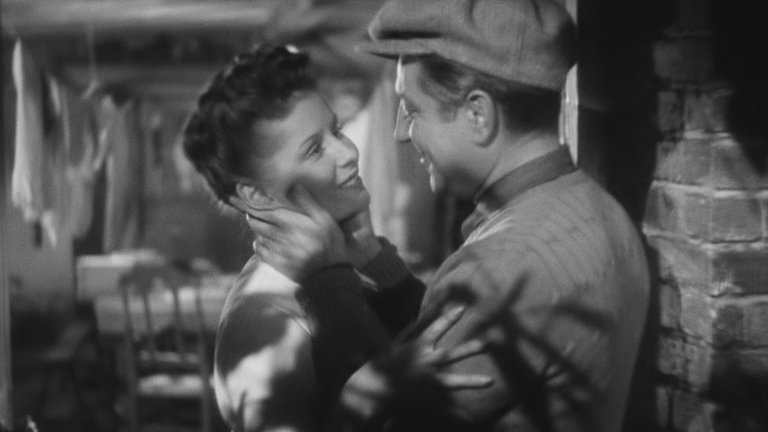Film Review: Daybreak (Le jour se lève , 1939)

Many of the French films that belonged to Poetic Realism movement became widely influential on world cinema. Chances for that were greater if they were directed by Marcel Carné. A year after Port of Shadows, first film ever to be described as “film noir”, Carné directed Le jour se lève (“Day Rises”, also known under English language title Daybreak), dark romantic drama that is credited to introducing modern technique of flashback.
The plot of the film begins when François (played by Jean Gabin), a foundry worker, shoots and kills a man named Valentin (played by Jules Berry). He locks himself in the apartment and refuses to surrender to police and during next few hours of siege reminisces how he got himself in such situation. Few months earlier he by accident met Françoise (played by Jacqueline Laurent), young and beautiful florist assistant. Two of them soon discover that they have some things in common – similar name and both being raised as orphans. Their friendship soon transforms into romance and François even proposes to marry her. But one night he sees her sneak her from her apartment. He secretly follows her to a night club where she is apparently enthralled by performance of Valentin, a dog trainer. He meets Clara (played by Arletty), Valentin’s assistant and former lover who wants to quit her job because she can’t stand Valentin. After learning that Françoise sees Valentin, older man who gives her money and entertains her with fantastical story, he begins affair with Clara. But he is still in love with Françoise and romantic rivalry between two men will end in violent and tragic way.
If Daybreak is to be compared with Port of Shadows, earlier film looks significantly better. This can be explained with script for Daybreak being much simpler, characters more ordinary, plot being reduced to romantic rivalry and setting for the large part being limited to single room. Despite those limitations, Carné directed film very well, putting some of the best resources of French cinema to good use, for the most part finding the right balance between being “poetic” and being “realistic”. One such example can be found in use of dissolves that would later become common practice for flashbacks, widely used in film noir. Another can be found in Carné actually building entire street and buildings from cardboard sets used in sequence that looks like it was made at authentic locations.
Even better impression is given by excellent cast. Jean Gabin, the greatest French star at time, plays another doomed anti-hero, although this time clearly associated with working class and less with crime and other elements from margins from society. His charisma is still intact and he easily manages audience forget that some of François’ actions aren’t morally acceptably (like having romantic relationship with two women at the same time). Arletty, one of the grand icons of 1930s and 1940s French cinema, is also good in the role of slightly older and world-weary, but still attractive woman. She also appears in the film’s only nude scene, something that was quite rare for 1930s French cinema and was cut by censors in many countries of the world. Jacqueline Laurent doesn’t have to go that far, but her charm and talent are compromised with some over-melodramatic plot developments near the end. Jule Berry, actor specialised in playing villains, is here very good in the role of manipulative sociopath who enjoys psychologically tormenting the protagonist.
Daybreak is, like many films of Poetic Realism, quite dark, which includes very unhappy ending. This, in a way, corresponded with general mood in France, which was just about to enter Second World War and soon get overran by Germans. During the occupation, film was banned by Vichy government because it was “demoralising”. Much bigger danger for Carné’s film, however, came from Hollywood immediately after the war. RKO Pictures bought the film rights and made its own, now mostly forgotten, remake The Long Night starring Henry Fonda. In order to prevent comparisons with French films, RKO tried very hard to obtain and destroy each copy of Daybreak. The film was actually considered lost for couple of years before being rediscovered and hailed as one of the finest French films of interwar period.
RATING: 7/10 (+++)
Blog in Croatian https://draxblog.com
Blog in English https://draxreview.wordpress.com/
Leofinance blog https://leofinance.io/@drax.leo
Unstoppable Domains: https://unstoppabledomains.com/?ref=3fc23fc42c1b417
Hiveonboard: https://hiveonboard.com?ref=drax y
Bitcoin Lightning HIVE donations: https://v4v.app/v1/lnurlp/qrcode/drax
Rising Star game: https://www.risingstargame.com?referrer=drax
1Inch: https://1inch.exchange/#/r/0x83823d8CCB74F828148258BB4457642124b1328e
BTC donations: 1EWxiMiP6iiG9rger3NuUSd6HByaxQWafG
ETH donations: 0xB305F144323b99e6f8b1d66f5D7DE78B498C32A7
